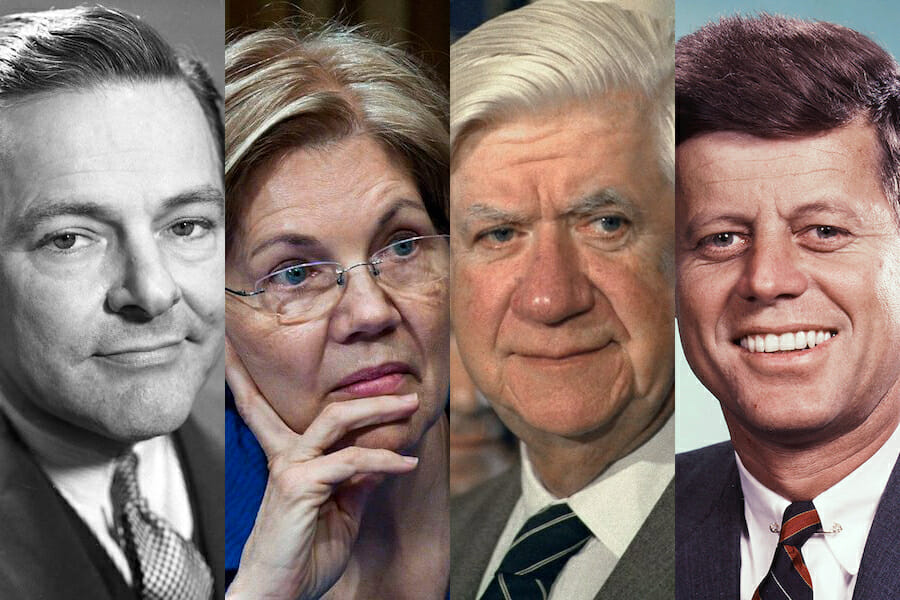
Politics
When Massachusetts Speaks, America Still Listens
To this day American history books lionize Massachusetts. During the colonial era and the Revolutionary War, sons of Massachusetts first entered national folklore as thinkers, organizers, and statesmen. Paul Revere’s midnight ride inspired poets and politicians. John Hancock’s signature boldly distinguished the Declaration of Independence and marked a milestone in calligraphy. Samuel Adams proposed the first Committee of Correspondence to spread revolutionary sentiment across the colonies. John Adams served as the second American president; his son John Quincy Adams served as the nation’s sixth president.
After the United States entered the world stage, during World War I and II, the Bay State still sent powerful politicians to Washington. Henry Cabot Lodge Sr. and his grandson, Henry Cabot Lodge Jr., Republicans, served in the U.S. Senate. The first Lodge family politician drew headlines for his opposition to U.S. involvement in the League of Nations; the second supported the United Nations as a global peacemaking institution.
Henry Cabot Lodge Jr.’s loss to John F. Kennedy in the 1952 Massachusetts U.S. Senate race began the Kennedy Era in American political history. During and after Kennedy’s rise to the White House, his home state would receive fawning media coverage and rich political patronage—attention far disproportionate to the state’s size. Speaker of the House Tip O’Neill, a Cambridge-born Irish politico, embrace his role as President Ronald Reagan’s chief political foil in Congress during the 1980s. O’Neill coined the phrase: “All politics is local.”
New political and cultural trends threaten the state’s place in political royalty. The 2009 death of Sen. Edward Kennedy left his family’s political dynasty without a patriarch and Massachusetts without a hard-bargaining senior statesman. The mass media persist in tagging the whole of the Bay State as a liberal special interest group, the realm of “elites” like Michael Dukakis, Paul Tsongas and John Kerry. Massachusetts Democrats have lost multiple presidential elections and the trend has defined a caricature. Worst, the latest U.S. Census indicates further depopulation of the Northeast. Massachusetts is losing one congressional seat while the Sun Belt states surge in population and political power. It is tempting for political analysts to discount Massachusetts as a political relic. But the state will likely keep its seat in Washington’s most exclusive meeting rooms.
Since colonial times, Massachusetts’ human resources, not its natural resources, have secured the state’s outsized influence. Through history, every state has found its own formula for shaping American domestic and foreign policy. Texas and Alaska have relied on oil, California has relied on gold and agriculture, and Arkansas has hoped for the perfect alignment of political planets. Massachusetts has long depended on a renewable resource—intellectual capital. Cambridge, Massachusetts is home to Harvard College, the nation’s first university and arguably its best liberal arts institution. For its large quantity of colleges, universities, and libraries, Boston is known as the “Athens of America.” For its association with so many Founding Fathers, it is known as the “Cradle of American Democracy.”
The Massachusetts public school system consistently leads the nation. The 2009 National Assessment of Education Progress report card ranked the state’s high school seniors the highest performing in the country in reading and math. In the 2010 report card released by the American Legislative Exchange Council, a conservative think-tank, Massachusetts ranked number two in a state-by-state breakdown of education achievement. A recently released report by the American Institute of Physics ranked the Bay State number one in the quality of its primary education system for preparing students for careers in engineering. Perhaps the state’s pristine education system has something to do with its enduring claim on national political debate. A new generation of Massachusetts-minted political heavyweights is poised for national exposure and accolades.
Elizabeth Warren, a veteran of nearly twenty years on the Harvard Law School faculty, now seems assured of easy victory in the race for the 2012 Democratic U.S. Senate nomination. She is a scholar and a populist hero. In addition to penning nine books, including two national bestsellers, Warren helped create and staff the Consumer Financial Protection Board, an effective new federal watchdog. If Warren were to defeat Sen. Scott Brown next fall—and she is running a campaign strong enough to do so—she would surely see her way to reelection in a state as Democratic as Massachusetts. She would have an opportunity to pursue national leadership on consumer protection and other issues with little political risk.
Deval Patrick, the current Democratic governor of Massachusetts and the state’s first black governor, has cultivated a national profile since his first inauguration in January 2007. A graduate of Harvard College and Harvard Law School, Patrick was appointed Assistant United States Attorney General by President Bill Clinton in 1994. Patrick, an ally and friend of President Barack Obama, has declared his intention not to seek reelection in 2014—opening the door to national office.
U.S. Congressman Ed Markey is an old hand in Democratic politics; he attended Boston College and Boston College Law School and was first elected to the House of Representatives in 1976. Most recently he led congressional inquiry into the BP oil spill, helping reveal to the public the precise magnitude of the disaster. Markey’s Boston-accented, hyperkinetic liberalism, especially on environmental issues, is iconic. Were Sen. John Kerry to retire in 2014, it is likely Markey would replace him and serve as dean of the Massachusetts delegation and a political mentor for Deval Patrick and Elizabeth Warren.
All three rising stars are in some respect products of the Massachusetts education system. Two are associated with Harvard. Gov. Patrick is rumored as a possible presidential contender. The Massachusetts political school seems to be hinged on a correlation between education, ideas, and power. The formula works. The state produces good ideas, the raw materials of the postindustrial economy. This produces good stories, the raw materials of political legend. There is a story about the famous Speaker of the House Thomas “Tip” O’Neill that describes Massachusetts political ingenuity—especially when branded by Boston Irish charm.
O’Neill revered his constituents in the Massachusetts 8th Congressional District. His staff honored every request for a pothole to be filled or a municipal stop sign to be moved. And O’Neill knew every neighbor in his district. One day he invited a fellow U.S. House member to join him for a championship high school football game in his district. O’Neill pointed at the packed stands opposite them, where hundreds of spectators cheered and pumped their fists. He asked his colleague, “Can you call ’em down?” “What do you mean ‘call ‘em down?’” O’Neill proceeded to call out, row by row, the name, occupation, and family lineage of every person attending the game. “All politics is local,” O’Neill always told fellow politicians. Count on Massachusetts to continue its tradition as a schoolhouse for America’s political leadership.
